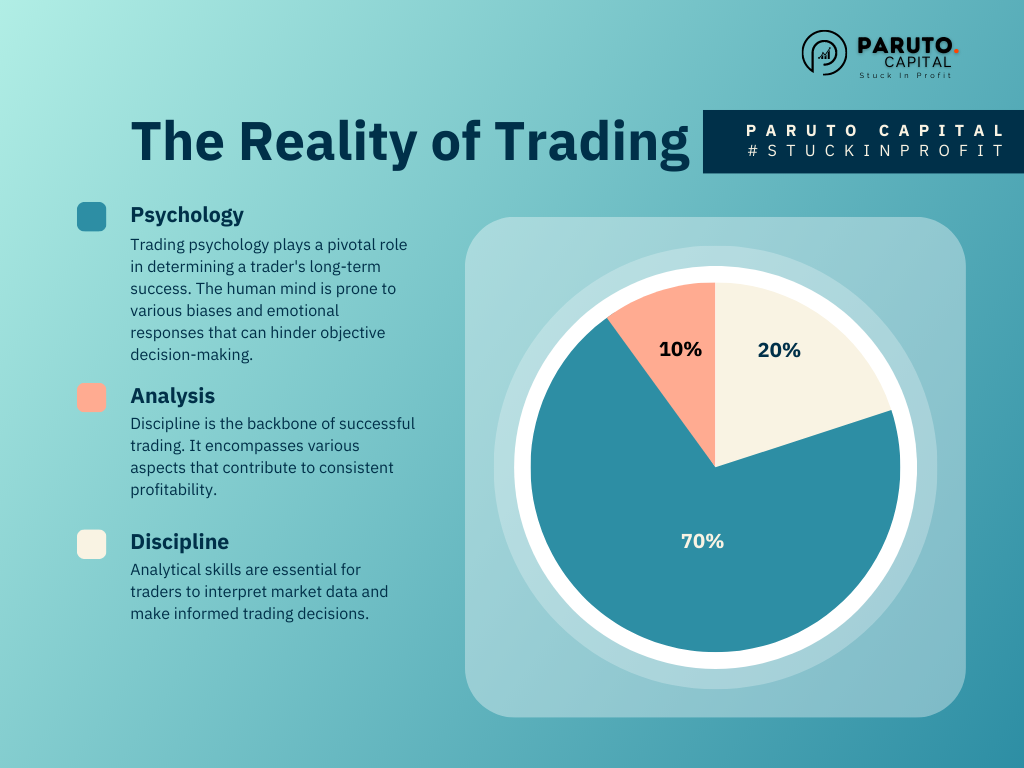Educate Yourself: Forex trading involves understanding various concepts, strategies, and market dynamics. Take the time to learn about the basics of forex trading (you can start with https://www.babypips.com/), including currency pairs, trading platforms, technical and fundamental analysis, risk management, and trading psychology. To take your learning to the next level, consider joining the Paruto Capital Mentorship – https://parutocapital.com (Get 5% OFF today! Use this code: MYPARUTOCAPITAL)
Practice with a Demo Account: Before risking real money, practice trading on a demo account provided by your broker. This will allow you to familiarize yourself with the trading platform and gain experience without the fear of losing money. Treat the demo account as seriously as you would a real account to make the most out of this learning phase.
Develop a Trading Plan: A trading plan is crucial for consistent and disciplined trading. Define your goals, risk tolerance, preferred trading style, and set clear rules for entering and exiting trades. Stick to your plan and avoid impulsive decisions based on emotions or market hype.
Start with Small Positions: As a new trader, it’s important to manage your risk carefully. Start with small position sizes and gradually increase them as you gain more experience and confidence. Avoid risking a significant portion of your trading capital on a single trade. With prop firms, you don’t need to risk your personal capital.
Use Risk Management Tools: Implementing proper risk management is essential. Set stop-loss orders to limit potential losses on each trade. Avoid overleveraging and risking more than a small percentage of your trading capital on any given trade (0.25% to 1% is a good place to start).
Focus on a single Currency Pair: Instead of trying to trade multiple currency pairs, focus on one that you understand well and can closely monitor. Each currency pair has its own characteristics and behaviors, so becoming familiar with one will enhance your decision-making process.
Utilize Technical and Fundamental Analysis: Technical analysis involves studying price charts, patterns, indicators, and trends to make trading decisions. Fundamental analysis, on the other hand, focuses on economic factors, news, and events that can impact currency values. Understanding and combining both analysis types can improve your trading strategies. Do not ignore red folder news releases!
Stay Informed and Join a Community: The #StuckInProfit mentorship community is a good place to start. Keep up with economic news, central bank announcements, and other relevant events that can impact the forex market. Stay informed about geopolitical developments and economic indicators of major countries. Economic calendars and financial news websites can help you stay updated.
Control Your Emotions: Emotions, such as fear and greed, can significantly impact trading decisions. Stick to your trading plan, avoid impulsive trades, and don’t let emotions cloud your judgment. Consider taking breaks from trading if you’re feeling overwhelmed or excessively emotional.
Learn from Mistakes: Forex trading is a continuous learning process. Keep a trading journal to record your trades, including the reasons for entering and exiting trades, and your emotions at the time. Review your journal regularly to identify patterns, learn from your mistakes, and refine your trading strategies.
Remember that forex trading carries risks, and it’s important to be patient, persistent, and disciplined. It takes time to develop skills and achieve consistent profitability. Consider seeking guidance from experienced traders or professionals in the #StuckInProfit Community, and always trade with money you can afford to lose.



